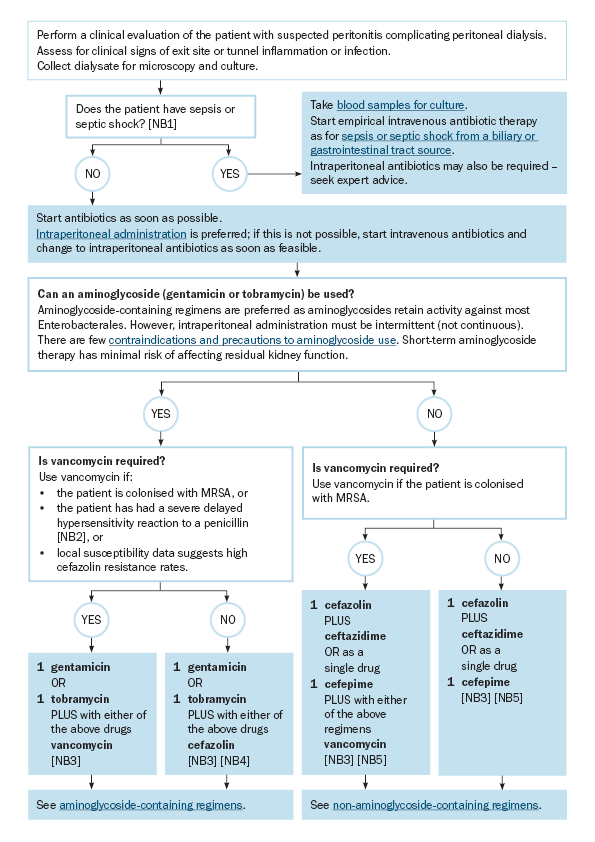Approach to empirical antibiotic therapy for peritonitis complicating peritoneal dialysis
The intraperitoneal route of administration is preferred for most antibiotics when treating peritonitis complicating peritoneal dialysis, because it delivers high local concentrations. Antibiotics should be administered on suspicion of peritonitis, and not delayed pending dialysis effluent white cell count and microscopy; delay to administration of antibiotic therapy results in higher rates of peritoneal dialysis catheter removal or deathMuthucumarana, 2016. If intraperitoneal administration of antibiotic therapy is not immediately possible (eg in a remote setting, delay to hospital admission), administer intravenous antibiotic therapy and change to intraperitoneal administration as soon as feasible. For empirical intravenous antibiotic choice, seek expert advice or follow local protocols.
Approach to empirical antibiotic therapy for peritonitis complicating peritoneal dialysis summarises the approach to antibiotic therapy for peritonitis complicating peritoneal dialysis. Empirical therapy includes antibiotics with gram-positive and gram-negative activity. The empirical regimens in this topic may need to be modified according to patient factors and local epidemiology, if known.

MRSA = methicillin-resistant Staphylococcus aureus
NB1: For definitions of sepsis and septic shock, see Identifying sepsis or septic shock.
NB2: Severe delayed hypersensitivity reactions include cutaneous adverse drug reactions (eg drug rash with eosinophilia and systemic symptoms [DRESS], Stevens–Johnson syndrome/toxic epidermal necrolysis [SJS/TEN], severe blistering or desquamative rash), and significant internal organ involvement (eg acute interstitial nephritis).
NB3: Add metronidazole to this regimen if diverticular disease or intestinal perforation (enteric peritonitis) is suspected.
NB4: For patients who have had a hypersensitivity reaction to a penicillin, cefazolin may still be appropriate – see Aminoglycoside-containing regimens for peritonitis complicating peritoneal dialysis.
NB5: For patients who have had a severe delayed hypersensitivity reaction to a penicillin, seek expert advice. For patients who have had another type of hypersensitivity reaction to a penicillin, a cephalosporin may still be appropriate – see Non-aminoglycoside-containing regimens for peritonitis complicating peritoneal dialysis.
